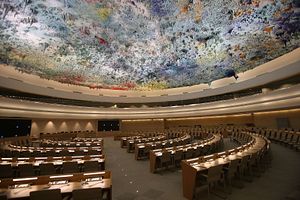The UN Human Rights Council’s (HRC) 33rd session began on Tuesday and Sri Lanka is on the agenda. The UN Working Group on Enforced or Involuntary Disappearances (WGEID) is set to officially release a report on the island nation. The report is already in the public domain, although this is the first time the document will be presented to the Geneva-based HRC.
Disappearances in Sri Lanka have been a longstanding problem. Appropriately, an Office of Missing Persons (OMP) is one of the four main pillars of the government’s transitional justice process.
More broadly, parliament’s recent passage of a bill to create the OMP should not go unnoticed, but the way in which the OMP was established should have domestic and international observers worried about forthcoming transitional justice mechanisms, especially the accountability mechanism to address alleged wartime abuses. Shortly after the legislation to create the OMP was passed, the Consultation Task Force on Reconciliation Mechanisms (CTF) issued a thoughtful statement.
Here’s part of that statement:
The CTF recognizes the significance of the decision by the Government to ascertain public views on the reconciliation mechanisms it has proposed. The CTF however notes the lack of information about the proposed mechanisms, the lack of awareness about the consultation process, and the persistence of fear in parts of the country of speaking out — all of which, hinder this process.
Here’s another paragraph:
The lack of information and awareness about the process by which the Office [of Missing Persons] was established, its role and functions has contributed to the fear and suspicion, including amongst the families of the Missing in Action (MIA), that the OMP will exclude them. Therefore whilst the government’s commitment to expedite the establishment of these mechanisms is appreciated, the lack of information, awareness, and attention to incorporating public views, particularly of those families affected by disappearances, reveals a troubling lack of sensitivity to the widespread nature of the crime of disappearances in Sri Lanka, the manner in which it continues to haunt families across the country, and the failure on the part of the state to address its horrific complicity in this crime over several decades.
Over at Lawfare, I recently published an essay that looks at the plight of Tamil political prisoners and what that might tell us about the government’s broader transitional justice agenda. One of the major takeaways is that, by failing to move on some of the smaller, less controversial reforms on its list, the government is sending the wrong message entirely. Relatedly, this reality should compel international observers to question how serious Colombo is about some of the more robust prescriptions outlined in the (co-sponsored) October 2015 HRC resolution on Sri Lanka, which deals broadly with transitional justice. (Importantly, Colombo’s compliance with the resolution will be reviewed during the HRC’s 34th session in March 2017.)
The concluding paragraph of the Lawfare article is as follows:
Releasing political prisoners would be a strong early step toward this goal [of building trust between the Sinhalese-dominated government and the Tamil community]. Though politically controversial, providing a complete list of Tamil political prisoners (including the location where each individual is being held) and immediately releasing most of them is precisely the type of confidence-building measure that the government could use to establish its transitional justice bona fides. The longer Colombo prevaricates on this issue, the easier it is to believe that war-related reform in Sri Lanka may be on the rocks.
For Sri Lanka’s transitional justice process, the coming months are crucial.
































